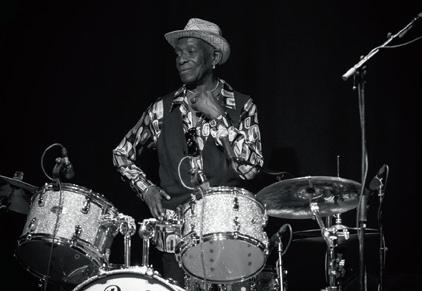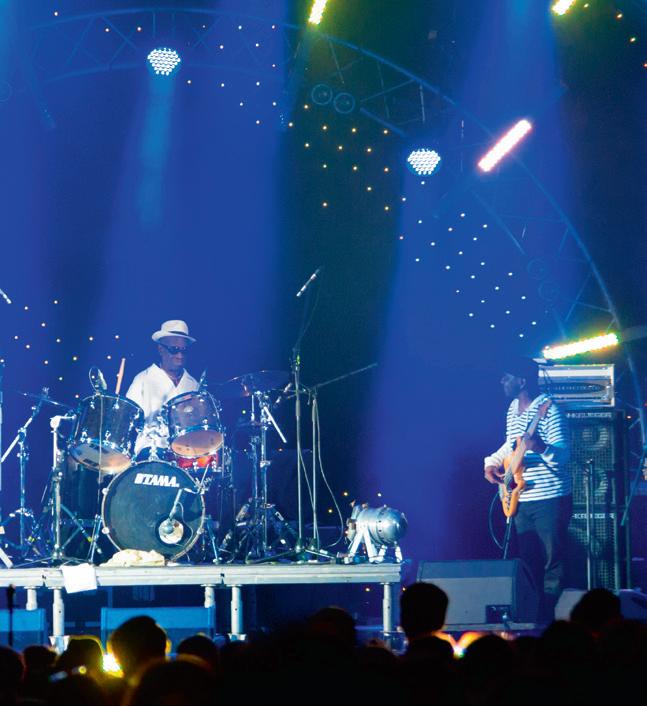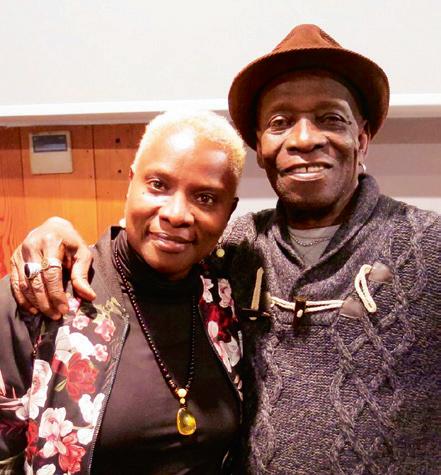
6 minute read
A tribute to the drummer who put the beat in Afrobeat - Tony Allen
West Africa has been paying tribute to drummer Tony Allen, who died in Paris on 30 April. The Nigerian was considered by many – among them legendary producer and musician Brian Eno and Red Hot Chili Peppers’ bassist Flea – to be the finest drummer the world has ever seen. His fluid, polyrhythmic style behind the kit put the beat in Afrobeat as an integral part of Fela Kuti’s band Africa ‘70 and he went on to find fame – and a host of A-list collaborators – around the world. Here Nigerian music lover Chidozie Uzoezie explores Allen’s indelible musical legacy.
When, in 1964, Fela Anikulapo Kuti invited a young Tony Oladipo Allen to his home studio Kalakuta Republic in Lagos to audition for his new Koola Lobitos jazz-highlife band, not many people, including Fela himself, envisaged how revolutionary a moment it would turn out to be. Although only 24 at the time, Tony Allen, who was born in Lagos of mixed Nigerian and Ghanaian parentage, was already a determined young man who had developed a unique drumming style that drew on jazz, highlife, funk and traditional African drumming.
Needless to say, Allen got the Koola Lobitos job and a long, fractious and yet rewarding musical relationship with Fela began. After co-creating Afrobeat, Allen continued to push the boundaries of his music – incorporating elements of dub, electronica, jazz and dance – until his death aged 79.
Deeply touching tributes have been pouring in since. Flea, the Red Hot Chili Peppers bassist, who worked with Allen in the supergroup Rocket Juice and the Moon, which released an album of the same name in 2008, described him as “one of the greatest drummers to ever walk this earth”. Also involved in that album was Ghanaian rapper M.anifest, who said Allen “put the beat in afrobeat” and lived a “quietly epic” life. Even Fela Kuti, who was not often given to praising others, said “without Tony Allen, there would be no Afrobeat”.
Afrobeat sound
Between 1968 and 1979, the FelaAllen combo proved to be a highly prolific and sought-after team. The duo invented and popularised the original Afrobeat sound in the 70s with the Africa ’70 band, combining elements of West Africa’s fuji music styles and highlife with American funk and jazz. They regularly engaged in marathon sessions of electrifyingly entertainment at Kalakuta Republic. “We’d play six hours a night, four days of the week, that’s what the people wanted,” Allen said in 2016. While Fela was the team leader, Allen was the musical director. Their decade-old synergy produced over 30 albums, including the classics ‘Gentleman’ and ‘Zombie’.
Recounting how he and Fela composed music in the 70s, Allen said: “Fela used to write out the parts for all the musicians in the Africa ‘70 Band. I was the only one who originated the music I played.”
Though there was mutual musical respect between them, Fela and Allen’s relationship was often fiery. Allen thought Fela was too direct and unnecessarily provocative in his criticism of the ruling military government’s corruption which led to too many arrests and even physical assaults by soldiers. Eventually, disagreements over royalties coupled with the incessant arrests caused Allen to part ways. His last performance with the Africa ‘70 band was at the Berlin Jazz Festival in 1979.
Experiments
Allen became even more experimental in his music, adding elements of pop, jazz, folk, soul, makossa, hip-hop, highlife, R&B, dub, and rap to form a hybrid he called Afrofunk.
Whatever the genre, Allen’s drumming style was instantly recognisable. Fela once said that he needed four different drummers to fill the gap Allen left behind in his band and his fluid, hypnotic style can kid the listener that there are more musicians involved.
For all his mastery of the instrument, Allen actually came late to the drums. He taught himself how to play at the age of 18, inspired then by American jazz drummers such as Art Blakey and Max Roach. He brought these complex jazz rhythms to Afrobeat and, in the words of Béninoise singer Angelique Kidjo, who featured him on two of her albums, “Allen changed the history of African music.
When it came to music, Tony Allen didn’t follow the rules, he broke them to the absolute admiration of his audience. From the usual and the expected, the Afrobeat pioneer often transcended to an extraordinary realm, mesmerising his audience. No wonder he was once described by English musician and record producer Brian Eno as “perhaps the greatest drummer who has ever lived”.
In the African culture, drummers were regarded as occupying the bottom rung on the musical ladder, but Allen came to the scene and changed the narrative. He brought prestige, dignity and professionalism to drumming. He gave the drum a voice.

Tore Setre | Wikimedia Commons | CC-BY-SA-4.0

On stage at the Tsaritsyno Park XII International Jazz Festival
Anton Gvozdikov / Shutterstock.com
Despite his achievements, Allen didn’t think he was entitled to everyone’s’ respect and reverence. To those who worked with him he was a warm and down to earth presence, always keen to hear their ideas and to collaborate. Bumi Thomas, a British-Nigerian jazz-folk-soul singer and guitarist, described him as “remarkable with a distinctive cool and timeless temperament”.
Allen’s musical style was similarly unassuming. In 2016, he said: “I know I can make my drums bring the house down if I have to. But I know how to make it subtle. You listen to it flowing like a river.”
Allen was not as politically influential or commercially successful as his compatriot Fela, but he remains one of Nigeria’s greatest musical exports. With 40 albums as a solo artist, including collaborations with hundreds of notable international acts, Allen quietly put Nigeria and Africa on the global music map.
He was keen to showcase Nigerian talent – both established and upcoming – which he did on 2006 album ‘Lagos No Shaking’ and at the time of his death he was making plans to record with young musicians in Nigeria, Paris, London and the US.
His Afrobeat sound is also hugely influential on the Afropop genre, which is dominating the current global pop scene and led by Nigerian artists such as Wizkid, Davido and Burna Boy. Without a doubt, Tony Allen meant and still means a lot to Nigerians. In 2019, he was honoured in Lagos with a tribute concert. According to Ayoola Sadare, the CEO of Inspiro Productions, which helped put the concert together: “Tony Allen is our very own living legend worthy of celebration. His impact on Afrobeat, jazz and world music is undeniable.”
Influential
Allen has influenced and inspired a range of artists across different genres, including English musician

Angelique Kidjo with Tony Allen
Image: Angelique Kidjo
Damon Albarn. The multi-instrumentalist first signalled himself as an Allen aficionado when in the band Blur with single ‘Music Is My Radar’, which includes the line “Tony Allen got me dancing.” It sparked a friendship and a series of musical collaborations – including the Africa Express Project and supergroup The Good, the Bad and the Queen – that continued until Allen’s death. In fact, this month Albarn released a tribute single How Far?’ by his hip-hop band alter ego Gorillaz, which features some of Allen’s last recorded drumming work.
Other international collaborations included work with Grace Jones, Charlotte Gainsbourg and French trio The JazzBastards.
But with a total of 77 albums to his name, Tony Allen can be said to have lived a fulfilled life. However, in addition to leaving nostalgic memories behind, he also left big shoes. Indeed, while Africa and Nigeria await the emergence of his true replacement, the world will continue to miss him and his ingenuity.
Top image: Ben Houdijk / Shutterstock.com

